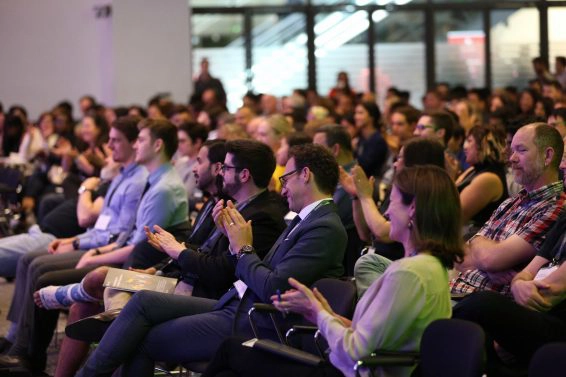Your Genesys Blog Subscription has been confirmed!
Please add genesys@email.genesys.com to your safe sender list to ensure you receive the weekly blog notifications.
Subscribe to our free newsletter and get blog updates in your inbox
Don't Show This Again.

Toronto is at odds with the Bay Area — and I’m not just talking about the Toronto Raptors vs. the Golden State Warriors in the NBA Finals 2019.
“In the past year, there were more new tech jobs added in the Toronto region than New York City and the San Francisco Bay Area combined,” according to Toronto Global. Toronto is making major investments in the evolving artificial intelligence (AI) scene — putting the city on the map on a global scale. New tech startups are emerging at an exciting rate while seasoned companies like Uber, Etsy and Samsung are expanding their offices to Canada’s largest city. Toronto is on its way to the top for AI technology growth.
So, it was no surprise that AI was a major topic at the 7th annual Toronto Tech Summit. Hundreds of attendees joined Genesys at the MaRS Discovery District for an afternoon with Toronto’s most forward-thinking innovators in technology and customer experience. And if I had a dollar for every time AI was mentioned, I could fund my own AI startup.
Despite its prevalence, there are still a lot of misconceptions about AI. Here’s a look at the do’s and don’ts of AI discussed at the summit.
Do think about business problems first, don’t just throw AI at them
As consumers are more open to engaging with technologies like AI, it can be difficult to determine where to start. Dan Rood VP, Product Marketing at Genesys kicked off the event with a keynote covering how to connect moments in the human economy. At Genesys, our mission is simple: Allow messages to be received and conveyed by companies from customers with the right channel at the right time. “We are just trying to build a better message in a bottle,” explained Rood.
So, don’t start with AI in mind; understand your business problem and how AI can help you solve it. New technologies come and go, but what really matters is the experience that customers take away.
Don’t replace agents with AI — blend AI with agent tools
AI is at the cusp of high school level learnings, so you shouldn’t fire your skilled agents for a technology that hasn’t even hit puberty. Adam Champy, Cloud Interactive AI Product Lead at Google, suggests business form the perfect convergence of AI in the contact center as it provides better experiences for employees and customers.
During his keynote on powering customer conversations with Google Cloud AI, we learned businesses must focus on the human experience. Agents need AI to be more educated about customer relationships, thanks to automation, while bringing a super power that AI cannot yet achieve — understanding motive and intention. AI doesn’t equal emotional intelligence, which is why we still need humans. AI is providing tools to support customers and deliver a better customer experience in all interactions while also bringing more humanity to it.
Do personalize your messaging
We’ve all met a bad chatbot; they lack the basic natural language processing capabilities to understand our intent. They repeat generic messaging that’s not authentic or helpful. And you need to pay attention to not only customer intent but also intent while using your company voice or brand.
“We believe that modality is the soul of the sentence, the intention beyond the words,” noted Shing Pan, VP of Marketing and Business Development at Speechmorphing, during the “Future with Customer Experience in AI” panel. Speechmorphing is one of the hundreds of apps from the AppFoundry Marketplace – they bring high-quality custom synthesized voices with dynamically changeable sentiments to Genesys customers.
Another valued partner, Mike Murchison, Co-Founder and CEO from Ada Support, shared how to provide a simple, yet powerful chatbot during his talk, “The Potential for Personalized Automated Support.”
“Don’t try to replace with AI, but rather it can enhance the empathy in customer experience that can become your differentiator,” said Murchison.
To personalize messaging for such a vast number of users, companies need to hire diverse employees to develop future tech-fed solutions. “We must inspire equality and diversity in the transportation (and any) industry,” noted Josipa Petrunic, Executive Director at CEO at CUTRIC, during her keynote, “Canada’s Future Mobility: Auto Dead, Transit Led, and Tech Fed.”
Don’t forget about AI ethics
No one can — or should — talk about AI without addressing concerns about data collection and privacy. During the panel discussion around how AI is shaping society, Peter Wittek, Assistant Professor at the University of Toronto, shared his belief in the need for AI ethics.
Alex Manea, Chief Security and Privacy Officer at Georgian Partners, discussed how levels of bias must be applied and defined by the society or government regulation. Therefore, data can be discriminatory. If we have data without bias, that data is basically useless. And AI ethics will become more important as the technology matures, join the conversation with Genesys to stay informed.
Thank you North, Ada Support, benevity, Cogeco Peer 1, SkipTheDishes, 247Labs, Startup Tech Unleashed and mealpal for their support of the Toronto Tech Summit. Please watch this short video to learn about our story.
Genesys is following suit to bring the best talent out of Toronto at the Markham office. Go to Careers.Genesys.com to learn more about joining the team.
Subscribe to our free newsletter and get blog updates in your inbox.